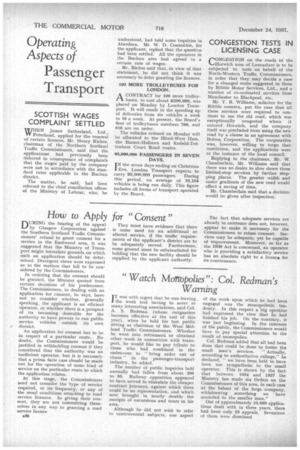"Watch Monopolies": Col, Redman's Warning
Page 24

If you've noticed an error in this article please click here to report it so we can fix it.
ITwas with regret that he was leaving, the work and hailing to sever so many interesting associations, said Col. A. S. Redman (whose resignation becomes effective at the end of this year), when he held his last public sitting as chairman of the West Midland Traffic Commissioners. Whether he went into retirement or obtained other work in connection with transport, he would like to pay tribute to those who had combined in the endeavour to " bring order out of chaos " in the passenger-transport industry, he added.
The number of public inquiries held annually had fallen from about 200 to 50. Railway opposition appeared to have served to stimulate the cheaper contract journeys, against which there could be no representation, and which now brought in nearly double the receipts of excursions and tours in his area.
Although he did not wish to refer to controversial subjects, one aspect of the work upon which he had been engaged was the' monopolistic tendency. In this respect a big operator had expressed the view that he had finished his job. On the contrary, it was just beginning. In the interests of the public, the Commissioners would have to pay special attention to the result of monopolies.
Col. Redman added that all had been done that could be done to faster the small man's services. " Actually, according to authoritative rulings," he declared, "we have been held to have been too sympathetic to the small operator. This is shown by the fact that between 1934 and 1937 the Ministry has made six Orders on the Commissioners of this area, in each case at the behest of the large company, withdrawing something we have accorded to the smaller man."
Out of approximately 10,000 applications dealt with in three years, there had been only 23 appeals. Seventeen of these were dismissed


























